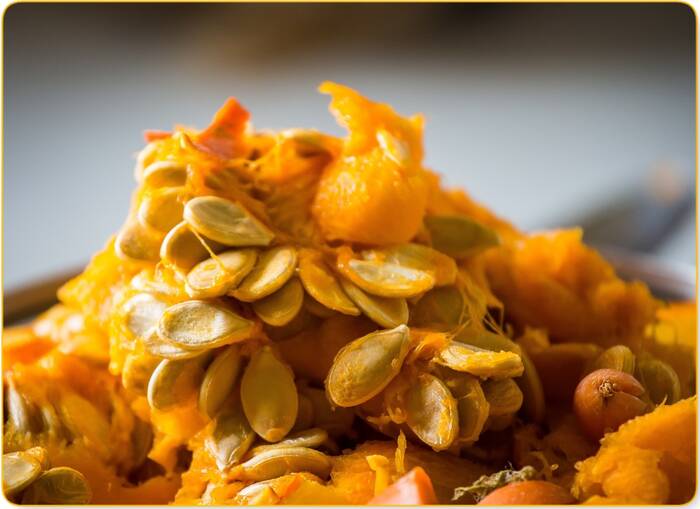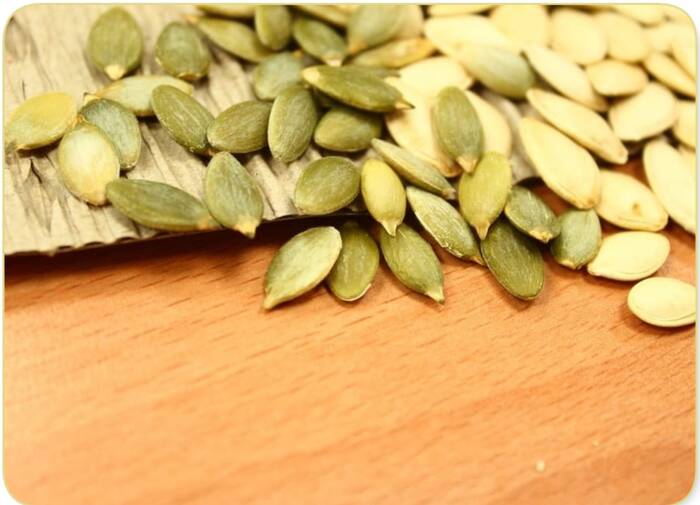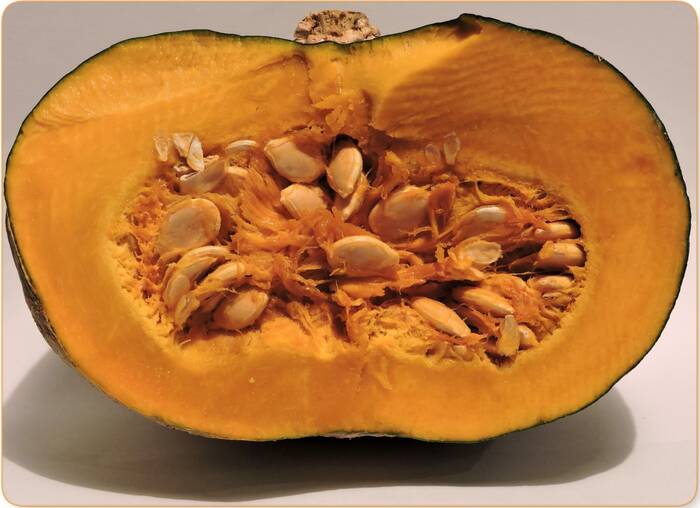Are pumpkin seeds good for bloating and gas? What foods cause gas and bloating? What are the benefits of pumpkin and its seeds? How to use seeds? How do consume them? What are the other benefits of Pumpkin Seeds? And Finally, what are the side effects of eating too many pumpkin seeds?
I- Causes of Bloating and Gas
Often causing discomfort, bloating is a common and frequent problem. Even though it is painful, it can only be treated at home. A medical consultation is only necessary if it persists for several days.
The first cause that we all know is the accumulation of gas in the stomach. The discomfort caused by certain foods, a stomach infection, or a chronic disease of some kind is very painful.
Examples of chronic diseases are Crohn’s disease and indigestion.
1. Indigestion
As for indigestion, it is excessive eating that is the major cause. In addition, certain medications that irritate the stomach or certain minor infections can cause bloating.
Beware, however, of idiopathic indigestion, which has no apparent cause. The latter would reveal the potential presence of an ulcer, cancer, or liver failure.
2. Infection in the Stomach
When the stomach suffers from an infection of any kind, painful gas occurs and is often accompanied by diarrhea.
Bacteria or viruses cause nausea and vomiting, which fade after a few days. Worsening of symptoms can be seen in fever or blood in the stool and requires immediate medical attention.
3. Water Retention
Salty foods, food intolerances, and changes in hormonal levels in the body promote water retention.
These factors cause the body to retain more fluid than normal. If fluid retention persists, a doctor should be consulted to rule out diabetes or kidney failure.
4. Constipation
A known cause of bloating, constipation is the result of dehydration, a lack of dietary fiber, or food intolerance.
Of course, intestinal disorders and nutrient deficiencies are also causes of constipation.
II- Foods that Cause Bloating and Gas
The foods that cause gas and bloating differ according to the profile of each person. However, those that are commonly known for this effect are first of all dried fruits because of the concentration of sugars that takes place during the transformation.
Apples, well known for their benefits, can nevertheless cause bloating in case of irritable bowel syndrome.
On the other hand, carbonated beverages and waters promote the entry of air into the digestive system leading to bloating. And, as is often the case, straws can increase the amount of air that enters the stomach, as they also contain air.
Coffee can weaken an already fragile stomach, resulting in even more bloating if sugar is added.
Large salads, white bread, fatty fish, meat, and dairy products have strong bloating effects and lead to the occurrence of gas.

III- Benefits of Pumpkin and Squash, and their seeds for bloating and digestive system
As squash contain a good amount of pectin, they contribute to the proper functioning of the intestines.
Indeed, this pectin has an action that reduces the absorption of calories and cholesterol. In the same way, this highly qualitative fiber ensures a delayed absorption of sugars.
By their richness in fibers, the pumpkin seeds are considered excellent laxatives. They solve the problems of transit and chronic constipation.
In a general way, the richness of the marrow in fibers solves the problems of the slowness of the transit by its absorption of the intestinal water.
The stimulation of the peristalsis, which means the movements of the intestines, decreases the problems of bloating and increases the volume of the stools.
The good thing about pumpkin seeds is that they can be consumed even in case of a sensitive stomach.
# Is Pumpkin Good for Gastritis?
Pumpkin is a natural product very rich in fiber and other essential nutrients like vitamins and proteins of all kinds.
Gastritis, as everyone knows, is an inflammation of the stomach lining that could have several different causes.
Among these causes, we often find stress, viral or bacterial infections, and sometimes quite serious illness or simply a deficit in the protection of the immune system.
The pumpkin and its seeds are, due to their nutritional composition, the ideal food to fight inflammation of the gastric mucosa. The pumpkin and its seeds stop the inflammation of the membrane of the digestive system and the stomach, stimulate the secretion of bile and encourage the immune system to get rid of foreign bodies.
And what gives more interest to the pumpkin and its seeds is its ease of digestion.
# Does Pumpkin Cause acidity?
Pumpkins and their seeds, despite their low acidity (Ph = 4.9) do not generally give acidity.
It is more of sweet fruit and has so many health benefits that we forget its ph.
Most people can eat it freely without any negative, except those who are allergic or have a serious digestive problem.
And in all cases, we advise you to eat it in moderation.
# Does Pumpkin Cause Gas in Babies?
The answer is quite simply no.
On the contrary, the mothers of new babies, give it as a puree from the fifth month in small quantities, given the richness of the nutrients it contains.
In addition, due to these fibers, it cleanses the stomach of babies and prevent them from bloating and gas, which originate from the fragility of their digestive system.
IV- How Much Pumpkin Seeds Should I Eat Per day?
To get the most out of pumpkin seeds, you will do well to integrate them into your diet.
If you want to consume them alone, we recommend the amount of 50 g of pumpkin seeds daily to start.
You can gradually increase the amount if you feel the need until you reach 80 g.

V- How to Eat Pumpkin Seeds?
Pumpkin seeds can be eaten raw, roasted, or sprouted. With any of these options, you will have to decide whether you are going to eat the pumpkin seeds with or without their shells.
Pumpkin seeds with their shells contain more fiber than bare seeds, but the shells are relatively hard and may take a little longer to break down and digest.
Eating raw pumpkin seeds is a healthy option, but you should be aware that they are high in phytic acid when not roasted or sprouted.
Phytic acid is found in foods like beans, seeds, nuts, and grains and can make nutrients like iron and zinc less bioavailable.
It can also inhibit the production of digestive enzymes, which help us break down food.
VI- Pumpkin Seeds: Composition
Pumpkin seeds are rich in oil and nutrients. The compositions close to the powdered seed are moisture 4.06%, ash 3.80%, crude fiber 2.91%, total lipids 36.70%, total protein 34.56%, total soluble protein 18.10%, sugar 1.08%, and starch 2.15%.
The mineral composition of the seeds is as follows: Nitrogen 5.53%, Phosphorus 0.71%, Sodium 4.80 Cmol/kg, Potassium 20.00 Cmol/kg, Calcium 4.40 Cmol/kg, Magnesium 348.7 ppm, Iron 290.0 ppm, Coper 70 ppm, Zinc 39.9 ppm, and manganese 17.9 ppm.
VII- Other benefits of Pumpkin Seeds
With multiple benefits, pumpkin seeds have antioxidant virtues that prevent cellular aging. Similarly, they are considered natural anti-inflammatory and antihypertensive.
This, without forgetting the reinforcement of the immune system which takes place due to the vitamins C and carotenoids. As well as their positive effect on the prostate.
Exhaustion should not worry you anymore! These famous seeds want to be energy boosters par excellence.
Their richness in vitamin C, magnesium, phosphorus, and iron fights fatigue, even nervous fatigue, and promotes a good mood.
Because in the presence of amino acids forming dopamine as well as B vitamins, the nervous system finds its health and its appeasement.
In addition, in case of wounds or acne, the pumpkin and its seeds promote healing. And as if by magic, its effect on the risk of cardiovascular diseases is very observed.
Without forgetting at the end to mention their effectiveness to stop the fall of the hair, and the role of pumpkin seeds in controlling pests and worms that swarm in the stomach.

VIII- Side Effects of Eating Too Many Pumpkin Seeds?
As we have just seen above, the recommended daily amount of pumpkin seeds to eat is 50 grams on average.
Pumpkin fiber and its seeds are much less soluble in the digestive system, and it is this characteristic that gives it the power to cleanse the stomach and intestines, and also allows it to effectively fight constipation, bloating, and gas.
But eating too much of it can have the opposite effect.
Indeed, by putting a little too much fiber in the digestive system, the bacteria of the digestion will make a lot of effort. Which will make them release gas.
We will then obtain the opposite effect of what we are looking for.
This large amount of fiber in the intestines can also cause diarrhea.
And if you don’t drink enough water, you can even have a problem with constipation, especially in sensitive people, who have intestines that don’t absorb fiber and carbohydrates efficiently and quickly enough.
We advise you, that in case of an overdose of pumpkin seeds, you should drink enough water and liquid to allow the solubility of the excess fibers!
Useful Links:
The potential of pumpkin seeds as a functional food ingredient: A review